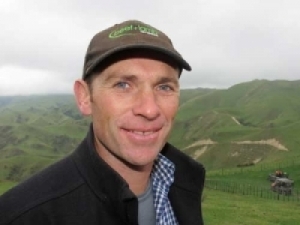Beef + Lamb NZ is proposing to stay in market development but do it completely differently.
Chairman James Parsons says it plans to move away from marketing activities already done by the meat companies and move into new territory – literally and figuratively.
He says market development is a core investment area for BLNZ of about $5 million a year. A review has looked at various scenarios from exiting to examining what a new role would look like.
"What has come through in this review – from farmers and industry – is that there is a role for BLNZ in marketing, but it's different," he told a mini-conference in Tuakau. "It is a theme [based on] telling the story.
"We [currently] promote our products on functional attributes – taste, tenderness, health and things like that which are important but a hard sell.
"The theme that has been coming through is the New Zealand 'story', [seen in how] the way the wine industry promotes its products."
A video presentation by Nicky Beeby, general manager of market development, to the mini-conference said a review resulted in a proposal to spend in three specific areas:
1) Brand layering: creating a NZ red meat story -- the story of NZ farming and processing. "It is recognising that our business-as-usual is considered exceptional by worldwide standards," says Beeby.
2) A much longer horizon on investment: the meat companies are focusing on the short term but no one in the industry is taking care of longer term investment.
3) Creating and identifying new market opportunities: that could be a new opportunity in an existing market or it could be a total 'greenfield' market.
"We want to invest in those opportunities; when they grow there is a natural point at which they are handed on to the meat companies," Beeby says.
They now have a framework agreed with the wider sector on a future market development programme. In July and August they will talk to farmers more about this in a consultation process.
Parsons says there was strong argument on whether BLNZ should exit marketing altogether.
"However, that left the question as to whether the industry would pick it up and do the promotion – and do it as required."
Parsons says $5m per annum to promote a $9 billion (including by-products) industry is not a lot.
"There are meat companies that invest in promotions as well, but put that in context: Zespri with about $1.6b [annual turnover] invests over $100m promoting kiwifruit. They have been successful at it; look what they have done."
In August last year, BLNZ committed to a review, retaining Deloitte and ThinkPlace to do it. There were interviews, focus groups and workshops with industry stakeholders across the value chain. Key themes that emerged were integrity, quality, market innovation, market education and issues management – crisis response. BLNZ can now start talking with farmers in detail.
"The NZ story taps into our values, our whole psyche and philosophy as a country," Parsons says. "You take that idea and put in a NZ story about what we produce. Think about our farming values and the philosophy we have on our production systems and what we do – create a 'social licence'."
A big change would be to move into new markets and new opportunities, getting away from established markets with short term horizons. The overwhelming view was that BLNZ should operate in new markets or exploit new opportunities within new markets, and leave the existing markets to the processors.
Those existing markets are competitive and it is hard to get collaboration with the processors.
"But they are quite happy to go into a greenfield market and work together....
"Where is the next slice of cheese? That's where we are probably looking as an organisation... This is still to be validated but it seems to be heading in that direction quite quickly."
Parsons says they have been trying to get collaboration with the processors. "You imagine trying to promote UK lamb together: really hard work, because you have deep entrenched investment by our processor exporters in those markets. It is a competitive space."
If BLNZ moved into greenfields areas, after a time the spending would scale down as that market became more mainstream and the processors started picking it up.
BLNZ is also looking at developing a long term strategy, critical to developing a leadership role in the sector, Parsons says.
"When we interview people in the market they say 'you've got this great story but you're not telling it'.
"A Singaporean chef asked, 'where is your signature?' That is probably where the thinking is going: how do we develop a signature? We have the GM-free thing, we have the no-antibiotic thing, but we're not telling the story."











